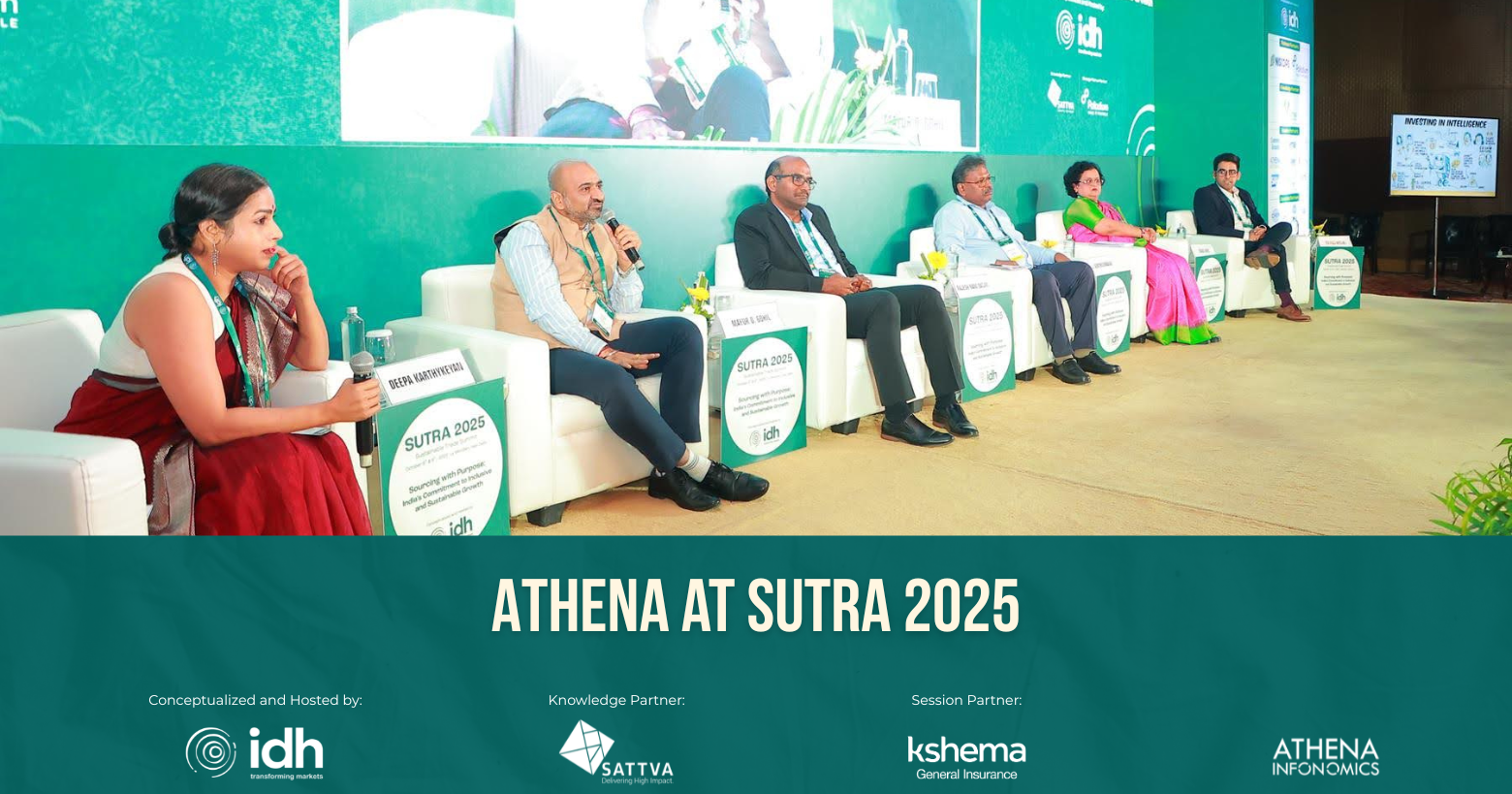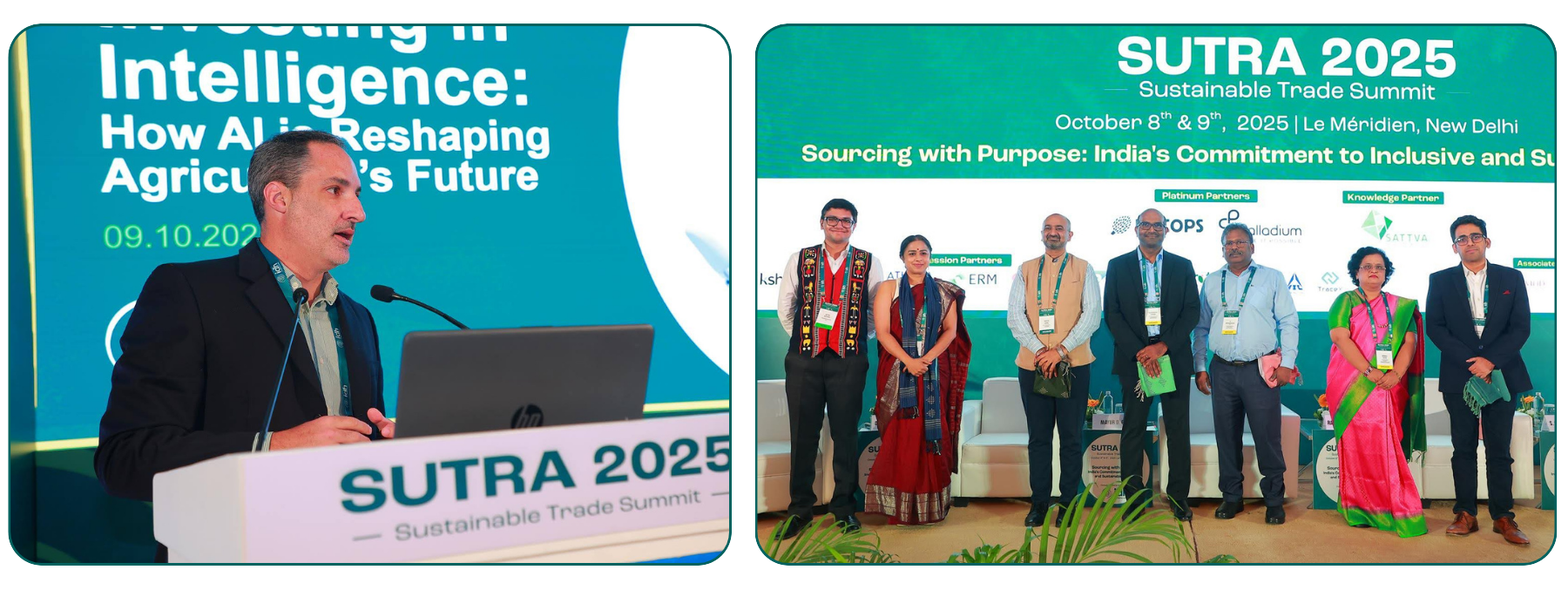

Artificial Intelligence (AI) is no longer a distant promise for India’s agricultural sector, it’s here, actively transforming how farms are managed, how risks are mitigated, and how sustainability is integrated across value chains.
At IDH SUTRA 2025, a platform bringing together over 400 leaders from business, finance, philanthropy, and farmer organisations to turn sustainability commitments into action – the focus was on building resilient, inclusive, and climate-smart agriculture. Within this broader dialogue, Athena Infonomics and Kshema General Insurance Limited co-hosted a session titled “Investing in Intelligence: How AI is Reshaping Agriculture’s Future,” featuring experts from Google Cloud, ITC MAARS, Wadhwani AI, Kshema General Insurance Limited, Reliance Foundation, and The World Bank Group.

The session opened with a Google Cloud masterclass illustrating how agentic AI is supporting farmers across the agricultural value chain. Demonstrations illustrated the potential the potential of AI tools to conduct market surveys, forecast rainfall, assess pest risks, and connect farmers to drone-based pest control and financial services.


While these tools offer immense potential, speakers underscored that this is just the beginning. Ensuring responsible use, transparency, and trust remains central to AI’s long-term success in agriculture.
Post the enlightening masterclass, Athena’s Co-Founder Deepa Karthykeyan took over as moderator steering an engaging panel discussion, that brought together leading practitioners driving AI adoption across India’s agri ecosystem. Deepa guided the conversation with sharp, practical questions, encouraging audience participation to make the session more interactive and grounded in real challenges from the field.
Responding to questions around how AI tools can move from pilots to everyday utility, Mayur D. Gohil, Vice President at ITC MAARS, demonstrated how technology is empowering farmers through intuitive, image-based diagnostic tools.

Adding to the discussion, Sonali Ghike, Senior Program Manager – Agriculture at Wadhwani AI, emphasized that meaningful innovation in agricultural AI must be co-created with stakeholders, through ongoing dialogue, on-ground insights, and shared data flows.

On the future of advisory platforms and risk of over-automation, Yuvraj Ahuja, Digital Agriculture Consultant at the World Bank Group, reiterated that AI is a layer, not a replacement.

When an audience member asked how AI can make insurance faster and more transparent for smallholders, Rajesh Nani Dasari, CEO of Kshema General Insurance Limited, shared how digital tools are transforming underwriting and claims.

Kshema’s approach leverages farm-level data and geospatial mapping to improve accuracy, prevent fraud, and ensure fair payouts. By digitizing ownership verification and streamlining underwriting, the company is redefining what transparency and trust can look like in agricultural insurance.
S. Senthilkumaran, Head of Platforms & Applications at Reliance Foundation, acknowledged the lack of unified datasets as a key barrier while responding to a question on data reliability and fragmentation.

He illustrated how Reliance Foundation is tackling this through participatory innovation, hackathons, FPO-led data initiatives, and partnerships with institutions like the Indian Meteorological Department, to ensure that AI models are rooted in local context and community trust.
The Q&A that followed reflected deep engagement from practitioners, agri-tech entrepreneurs, and financiers in the room. Questions centered on preventing AI “hallucinations,” ensuring data privacy, and making advisory models accountable when errors occur. Participants also probed business viability, how private players can sustain innovation without perpetual grants, and how AI recommendations could avoid flooding markets with the same crops.
Panelists acknowledged these concerns, pointing to ongoing safeguards like human-in-the-loop protocols, regulatory oversight, and farmer cooperatives that validate data. The conversation underscored that AI’s promise in agriculture lies in augmenting human intelligence, not replacing it.

The session closed with a call to action that encapsulated the spirit of the discussion:
As the session lead noted in conclusion, “AI in agriculture is not a distant ambition, it is a present opportunity. The challenge and the responsibility lie in ensuring that its adoption remains farmer-centric, sustainable, and investable.”
To know more, you can reach out to Michael Minkoff, Siva Balasubramanian, Vandana Sharma, Kadambari Anantram.